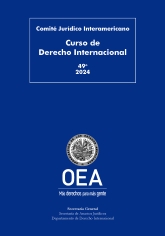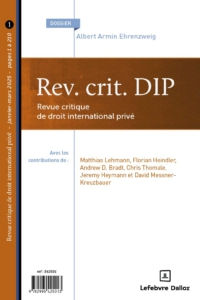Views
The Development of forum non conveniens in the Chinese Law and Practice
by Arvin LUO Fuzhong, Doctoral Candidate at Tsinghua University, Visiting Research Associate at HKU, LL.M. (Cornell), Bachelor of Laws (ZUEL).*
The doctrine of forum non conveniens is an important principle in civil procedure laws and frequently applied by courts in many legal systems, especially those of common law countries. According to this principle, when courts exercise their discretionary power to determine whether to exercise jurisdiction over the factual circumstances of a case, they primarily consider issues of efficiency and fairness to find the most appropriate forum to settle the dispute. If the acceptance of a case would lead to inefficient outcomes and consequences that are contrary to justice, the court may refuse to exercise jurisdiction on the grounds that it is not the appropriate forum.
Unrealized by many international scholars and practitioners,[1] China has been adopting (formally or informally) the doctrine of forum non conveniens for more than 30 years, first through a few court judgments, then provided in judicial interpretations issued by the Supreme People’s Court of PRC (“SPC”), which is binding for all Chinese courts, and finalized in the 2024 Civil Procedure Law of PRC. This article introduces the history of Chinese law adopting the doctrine of forum non conveniens in the past years, and the development of China’s law revision in 2023. Read more
Moroccan Supreme Court Confirms Child Return Order to Switzerland under the HCCH 1980 Child Abduction Convention
I. Introduction
It is not uncommon for scholars examining the interplay between the HCCH 1980 Child Abduction Convention and the legal systems of countries based on or influenced by Islamic Sharia to raise concerns about the compatibility of the values underlying both systems. While such concerns are not entirely unfounded and merit careful consideration, actual court practice can present a very different reality.
Morocco’s engagement with the Hague Conventions, notably the HCCH 1980 Child Abduction Convention and the HCCH 1996 Child Protection Convention, provides a particularly illustrative example. As previously reported on this blog (see here, here and here), Moroccan courts have thus far demonstrated a clear willingness to engage constructively with the HCCH instruments, effectively dispelling – at least to a significant extent – concerns about the existence of a so-called “Islamic exceptionalism” as an obstacle to resolving parental child abduction cases. The case presented here provides yet another compelling example of how Moroccan courts interpret and apply the HCCH 1980 Child Abduction Convention in a manner consistent with Morocco’s international obligations. This is particularly noteworthy given the presence of elements often cited as indicative of “Islamic exceptionalism.” Read more
Brazil’s New Law on Forum Selection Clauses: Throwing the Baby out with the Bathwater?
This post was written by Luana Matoso, a PhD candidate and research associate at Max Planck Institute for Comparative and International Private Law in Hamburg, Germany.
Brazil has changed its law on international forum selection clauses. In June this year, a new statutory provision came into force, adding, unexpectedly, new requirements for their enforceability. In this attempt to redistribute domestic litigation, the Brazilian legislator may well have thrown out the baby, international forum selection clauses, with the bathwater.
News
Out Now: The 50th anniversary of the first Inter-American specialized conference on private international law. The future of private international law in the Americas by Dante Mauricio Negro Alvarado

The Department of International Law (Secretariat for Legal Affairs) of the Organization of American States (OAS) has just published in essay form the lectures delivered during the 49th Course on International Law, which was held on 5 -16 August 2024. For more information, click here.
The book features the following piece: The 50th anniversary of the first Inter-American specialized conference on private international law. The future of private international law in the Americas by Dante Mauricio Negro Alvarado (in English, p. 295-335). This is a must-read for Private International Law academics and lawyers from the region and beyond. Read more
Call for Abstracts – Emerging Voices in Private International Law (Asser Institute)
Post prepared by Eduardo Silva de Freitas, PhD researcher Erasmus University Rotterdam and junior researcher at the Asser Institute
As part of its 60th anniversary celebrations, the T.M.C. Asser Institute invites abstracts for the panel “Emerging Voices in Private International Law”, to be held on 24 October 2025 in The Hague, at the conference Adapting Private International Law in an Era of Uncertainty.
The panel will feature two early-career scholars (PhD candidates or postdoctoral researchers) presenting original work in the field. Selected participants will also contribute to a forthcoming volume in the Short Studies in Private International Law series.
To apply, please submit a 400-word abstract and brief personal details by 15 August 2025 (24:00 CET) to: e.silva.de.freitas@asser.nl
Full call for abstracts: https://www.asser.nl/media/797989/call-for-abstracts_pil_asser.pdf
Revue Critique de droit international privé – issue 2025/1
 Written by Hadrien Pauchard (assistant researcher and doctoral student at Sciences Po Law School)
Written by Hadrien Pauchard (assistant researcher and doctoral student at Sciences Po Law School)
The first issue of the Revue Critique de droit international privé of 2025 has just been released. It gathers six contributions honouring Albert Armin Ehrenzweig and his legacy, as well as seven case notes and numerous book reviews.
The doctrinal part of the volume is devoted to the proceedings of the Albert Armin Ehrenzweig Conference organized in June 2024 at the University of Vienna, fifty years after the passing away of the great author. The contributions commemorate both the man and the scientist, testifying to the relevance of Albert A. Ehrenzweig’s scholarship to contemporary private international law. They are published in French in the printed version of the Revue (also available online here), and will be available shortly in English (here).


